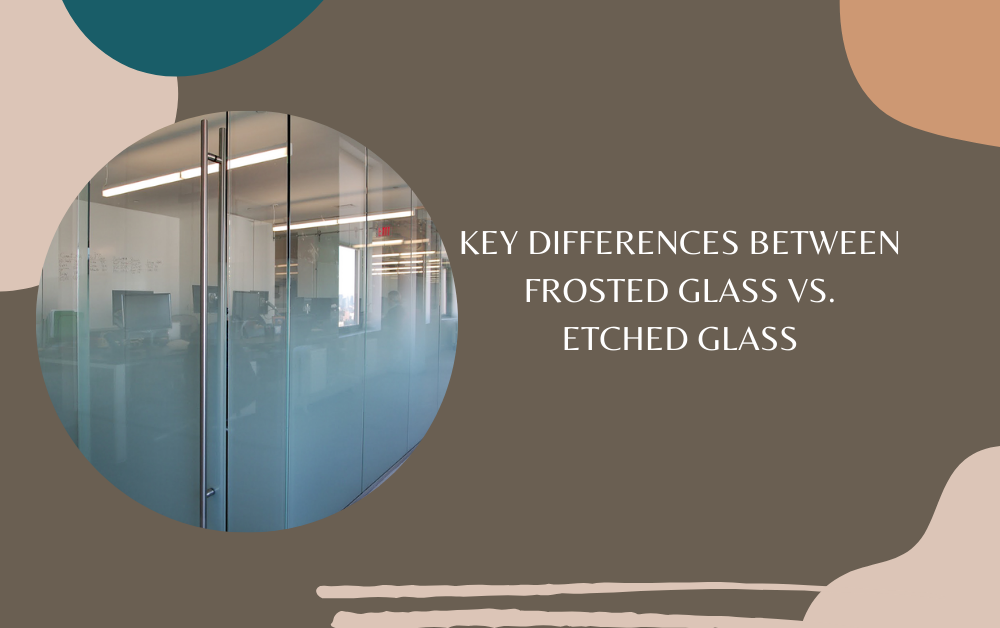
Key Differences Between Frosted Glass vs. Etched Glass
Introduction to Frosted and Etched Glass
Frosted glass and etched glass are popular choices for adding privacy and decorative elements to glass surfaces. Despite their similar appearance, they are created using different processes and offer distinct benefits. frosting is typically made by applying a translucent film or sandblasting the surface, while etched glass is created through an acid-etching process. Both types diffuse light, reduce glare, and provide a frosted appearance, but their differences lie in their creation methods, durability, and applications. Understanding these fundamental differences will help you determine which type of glass is best suited for your needs.
Choosing the right type of glass for your home or office can be a challenging task, especially when you are torn between frosted glass and etched glass. Both types offer unique benefits and aesthetic appeal, but understanding their differences is crucial for making an informed decision. This article delves into the key differences between frosted glass and etched glass, their characteristics, and their ideal applications. By the end, you’ll have a clear understanding of which option best suits your needs and preferences, ensuring you make the right choice for your space.
Understanding Frosted Glass
Creation Process
Frosted glass is a type of glass that has been treated to have a translucent, frosted appearance. This is usually achieved through sandblasting or applying a frosting for glass to the glass surface. The sandblasting process involves shooting fine grains of sand at high speed onto the glass surface, creating a rough, frosted texture. Alternatively, a frosted adhesive film can be applied to the glass, which is a more affordable and less permanent option. This film can be easily applied and removed, making it a versatile choice for those who want flexibility in their decor. The choice of method depends on the desired durability and budget.
Characteristics of Frosted Glass
Frosted glass offers several key characteristics that make it a popular choice for both residential and commercial applications. Its translucent nature allows light to pass through while providing privacy. The frosted surface also diffuses light, reducing glare and creating a soft, even illumination. Additionally, frosted glass is relatively easy to clean and maintain, making it a practical choice for various settings. The smooth finish of frosted glass also prevents fingerprints and smudges from being easily visible, which is a common concern with clear glass. This makes it an ideal choice for high-traffic areas where maintaining a clean appearance is essential.
Applications of Frosted Glass
Frosted glass is widely used in various applications due to its versatility and aesthetic appeal. Common uses include bathroom windows, shower enclosures, office partitions, and doors. It is also used in decorative elements such as glass cabinet doors, room dividers, and decorative panels. The ability to customize frosted glass with different patterns and designs further enhances its appeal, allowing for personalized and unique decor. In commercial settings, frosted glass can be used to create branded designs, adding a professional touch to office spaces. The adaptability of frosted glass makes it suitable for both functional and decorative purposes, catering to a wide range of needs.
Understanding Etched Glass
Creation Process
Etched glass is created through a chemical process that involves applying an acid or abrasive substance to the glass surface, which etches away a thin layer of the glass. This process creates a permanent frosted or textured design on the glass, resulting in a detailed and elegant appearance. The most common method for creating etched glass is acid etching, where a stencil or resist is applied to the glass surface to protect specific areas. Acid is then applied to the exposed glass, which etches away the surface, creating a frosted or textured design. This method allows for precise and intricate patterns, making etched glass a popular choice for detailed decorative work.
Characteristics of Etched Glass
Etched glass is known for its durability and permanence. The etched design is a permanent feature of the glass and cannot be removed or altered, making it a long-lasting and resilient option. The textured surface also provides a unique tactile quality, adding depth and interest to the glass. Like frosted glass, etched glass diffuses light and provides privacy, making it a practical and attractive choice for many settings. The permanence of etched glass ensures that the design remains intact over time, even in high-traffic areas. This durability makes etched glass a suitable choice for applications where longevity is a priority.
Applications of Etched Glass
Etched glass is often used in high-end residential and commercial applications where detailed and intricate designs are desired. Common uses include decorative windows glass, doors, glass partitions, and signage. It is also popular in custom projects such as glass artwork, tabletop designs, and architectural elements. The ability to create custom designs and patterns makes etched glass a versatile and desirable option for those seeking a unique and elegant look. In commercial settings, etched glass can be used to create branded designs, adding a professional touch to office spaces. The adaptability of etched glass makes it suitable for both functional and decorative purposes, catering to a wide range of needs.
Key Differences Between Frosted and Etched Glass
Method of Creation
The primary difference between frosted glass and etched glass lies in their method of creation. Frosted glass is typically created through sandblasting or applying a frosted film, while etched glass is created through an acid-etching process. This difference in creation methods affects the durability, permanence, and design capabilities of each type of glass. Understanding these differences is crucial for making an informed decision about which type of glass is best suited for your needs.

Durability and Permanence
Etched glass is generally more durable and permanent than frosted glass. The acid-etching process creates a permanent design that cannot be removed or altered, making it a long-lasting and resilient option. Frosted glass, particularly when created with a frosted film, may not be as durable or permanent. The film can be removed or damaged over time, making it a less durable option compared to etched glass. This distinction is important for applications where durability and permanence are critical factors.
Design Capabilities
Etched glass offers greater design capabilities and precision compared to frosted glass. The acid-etching process allows for detailed and intricate patterns, making it ideal for custom and decorative work. Frosted glass, while still customizable, may not offer the same level of detail and precision as etched glass. The sandblasting or film application methods may limit the complexity of the designs that can be achieved. This difference in design capabilities is crucial for projects requiring intricate and detailed designs.
Cost Considerations
Cost is another important factor to consider when choosing between frosted glass and etched glass. Frosted glass, particularly when created with a frosted film, is generally more affordable than etched glass. The sandblasting and film application methods are less labor-intensive and expensive compared to the acid-etching process. However, the cost of etched glass may be justified by its durability, permanence, and superior design capabilities. Understanding the cost implications is crucial for making an informed decision that aligns with your budget.
Choosing the Right Glass for Your Needs
When deciding between frosted glass and etched glass, consider your specific needs and preferences. Both types of glass offer unique benefits and can enhance the look and functionality of your space. Here are some factors to consider when making your decision:
Privacy and Light Diffusion
Both frosted glass and etched glass provide privacy and diffuse light, making them suitable for applications where these features are desired. Consider the level of privacy and light diffusion you need for your specific application, and choose the type of glass that best meets those needs. Understanding these factors is crucial for making an informed decision that aligns with your needs.
Design and Aesthetic Preferences
If you require detailed and intricate designs, etched glass may be the better choice due to its superior design capabilities. If you prefer a simpler, more versatile option, frosted glass may be more suitable. Consider your aesthetic preferences and the overall look you want to achieve when choosing between frosted and etched glass. Understanding these preferences is crucial for making an informed decision that aligns with your design vision.
Budget and Durability
Consider your budget and the durability requirements of your project. If cost is a primary concern, frosted glass may be the more affordable option. However, if you require a long-lasting and permanent solution, the durability and permanence of etched glass may justify the higher cost. Understanding these considerations is crucial for making an informed decision that aligns with your budget.
Conclusion
Both frosted glass and etched glass offer unique benefits and can enhance the look and functionality of your home or office. Understanding the key differences between these two types of glass can help you make an informed decision about which option is best suited for your needs. Whether you choose frosted glass for its versatility and affordability or etched glass for its durability and intricate design capabilities, both options can add privacy, style, and a touch of sophistication to your space.
In conclusion, choosing between frosted glass and etched glass ultimately depends on your specific needs, preferences, and budget. By considering the characteristics, creation methods, and applications of each type of glass, you can make a well-informed decision that enhances the beauty and functionality of your space. Embrace the potential of frosted and etched glass and discover how these unique materials can transform your home or office into a stunning and private haven. Understanding these factors is crucial for making an informed decision that aligns with your needs and preferences.
Note :- To Read More Articles Visit on- liveblogaus


